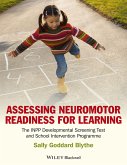This is the first book devoted to the P scales; there has been no published research on the P scales. There is no documentation of the benefits that schools have derived from using the P scales, and no account has been given of how easy or otherwise teachers have found it to use the P scales in the assessment of their pupils. The book introduces the P scales and their application to teachers, describes the various subject areas of the scales and how to apply them in the assessment of pupils attainment levels. The book also describes how schools can use the assessment data collected in self-evaluation and setting of improvement targets for their pupils. It also discusses the P scales in terms of the validity and reliability of data collected and investigates the extent to which the scales measure what they were designed to measure. Head teachers have recounted their experiences of using the P scales, outlining the difficulties they have had in their schools using the scales and the benefits the schools have derived.
Dieser Download kann aus rechtlichen Gründen nur mit Rechnungsadresse in A, B, BG, CY, CZ, D, DK, EW, E, FIN, F, GR, HR, H, IRL, I, LT, L, LR, M, NL, PL, P, R, S, SLO, SK ausgeliefert werden.









